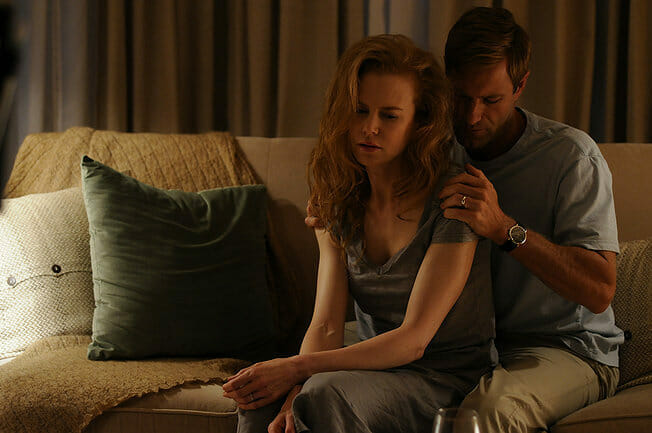
Director: John Cameron Mitchell
Writer: David Lindsay-Abaire
Cinematographer: Frank G. DeMarco
Starring: Nicole Kidman, Aaron Eckhart, Dianne West, Sandra Oh, Tammy Blanchard
Studio/Runtime: Lionsgate /92 min.
While some subjects seem absolutely natural to film, others are just the opposite. The death of a child is so personal and so interior that it’s ill-suited to a form that allows us to see what characters are doing but never get inside their heads. But that’s the challenge confronted by Rabbit Hole. Eight months after their son Danny is killed in a car crash, Howie (Aaron Reckhart) and Becca (Nicole Kidman) are still living one day at a time with their grief and struggling to return their lives to anything approximating normalcy. Howie turns to a support group for other parents of deceased children, eventually taking up smoking pot with a woman there in order to cope with reality, while Becca begins following around the teenager who accidentally killed her son, eventually confronting him when it becomes obvious what she’s doing.
Rabbit Hole is unsurprisingly subdued, but it’s a remarkable tone for director John Cameron Mitchell, whose previous films Hedwig and the Angry Inch and Shortbus wouldn’t imply he had something like this in him. Mitchell lets his stars control the picture, and they bring out a full range of emotion with particularly great performances by Eckhart and Dianne Wiest who plays Becca’s mother. These performances give the film the intensity of a Cassavetes picture but with a more controlled director who gives every frame of the movie thematic potency. That may sound heavy-handed, but it reflects the viewpoints of Rabbit Hole’s two distraught parents, who are in fact seeing every aspect of their lives shaded by their son’s death—whatever they do, the inescapable loss follows them around.
Rabbit Hole may be accused of formlessness, but it’s because this is a story rarely told and one that doesn’t easily stay within a traditional three-act structure—the plotting is very careful but also subtle. Howie and Becca move on with their lives slowly, and anyone looking for a Hollywood resolution should stay away. Likewise, it’s not a film that shies away from difficult questions of faith and mortality, there’s no irreverence to make things easier to watch. Fortunately, though, this is done in a way that feels natural to the characters’ lives. The story is never twisted into becoming a pulpit for the director or screenwriters; it’s just that with such heady material being addressed, ignoring existential questions raised by the crisis would make the movie facile. There’s a really thin line the film has to walk in order to keep from becoming exploitative or condescending, but by truly caring about these characters it’s able to keep its footing steady.
Despite being at its heart a domestic drama, Rabbit Hole has some of the most difficult to watch scenes of the entire year. Empathetic characters act horribly to each other, repeatedly, but it’s misery that comes with growth and we’re told that there is a light at the end of the tunnel, even if it’s not the one its characters are really hoping to find. It’s not a documentary, but Rabbit Hole is one of the most true films to be made in a long time, a beautiful tribute to those coping with loss and trying to make sense of the world.